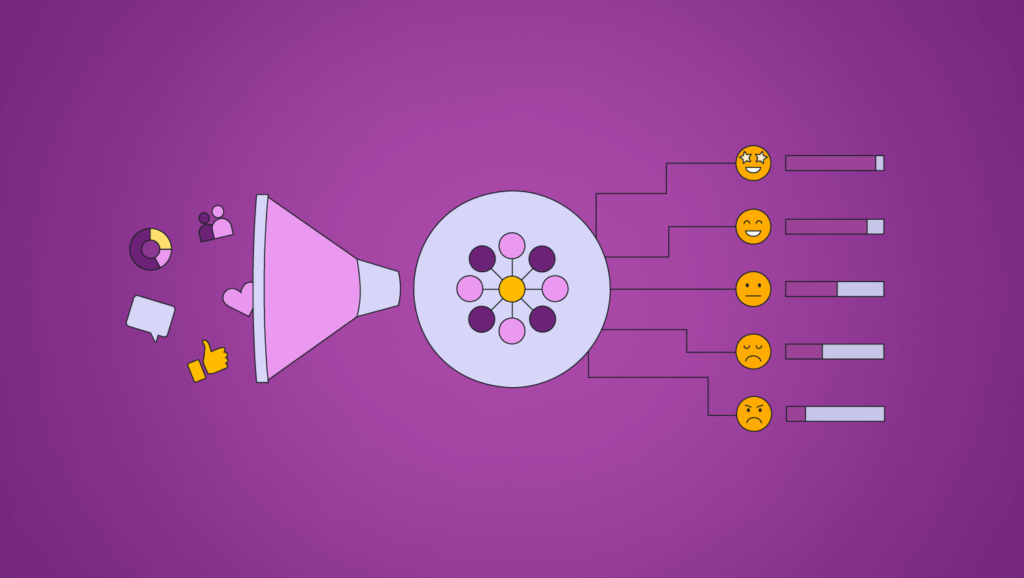Human emotion is woven throughout the words your consumers use online, just as nonverbal clues are in face-to-face contact. The goal of sentiment analysis tools is to decipher such feelings and comprehend how consumers feel about your brand. However, sentiment monitoring is not easy.
Analyzing hundreds of discussions, brand mentions, and reviews across several websites and platforms—some occurring in real-time—is what we’re talking about. For the work, a sentiment analysis tool is required. Some of the best sentiment analysis tools are included in this article to assist you in tracking and evaluating consumer perception of your company.
Top Sentiment Analysis Tools

1. Sprout Social
Sprout Social provides comprehensive social media management tools, such as detailed sentiment analysis and AI-powered listening. Keep an eye on the millions of discussions taking place in your sector on various platforms. With the help of this one of the top sentiment analysis tools, you can accurately gauge how consumers feel and think about certain subjects or companies by identifying emotion in even the most complicated words and emojis.
See how customers feel about your brand on average, and monitor changes in sentiment over time. To reply promptly and efficiently, sort individual posts and messages by emotion. Additionally, Sprout facilitates multilingual sentiment analysis, which aids in comprehending and connecting with a multicultural clientele.
Without altering your query, you may access a comprehensive range of data that has been classified and sorted by smart categories, including people, places, products, and more. Moreover, to further improve your analytical landscape, our Queries by AI Assist tool suggests keywords for listening queries.
Features:
- Social Media Monitoring.
- Social Media Integration.
- Negative Feedback Management.
- Dashboard.
- Data Visualization.
- Editorial Calendar.
- Performance Metrics.
- Response Management.
- Task Management.
- Competitive Analysis and many more.
Price:
- Standard: $249/user/month.
- Professional: $399/user/month.
- Advanced: $499/user/month.
2. InMoment
The customer experience platform InMoment leverages advanced artificial intelligence from Lexalytics to analyze text from multiple sources and transform it into valuable insights. This powerful tool can process customer feedback from surveys, reviews, and social media comments, extracting key themes and trends that businesses can use to improve their services.
By identifying sentiment, intent, effort, and emotions behind the words, InMoment helps companies understand how their customers truly feel. Additionally, with support for over 30 languages and dialects, it allows businesses to analyze feedback on a global scale, making it an essential tool for enhancing customer satisfaction and engagement.
Features:
- Pulse Surveys.
- Dashboard.
- Alerts/Notifications.
- Reporting & Statistics.
- Text Analysis.
- Sentiment Analysis.
- Survey/Poll Management.
- Engagement Tracking.
- Multi-Channel Communication.
- Real-Time Comparisons and many more.
Price: Contact sales.
3. Medallia
Medallia’s experience management platform offers powerful listening tools capable of detecting sentiment across multiple formats, including voice, text, and video. This one of the best sentiment analysis tools enables businesses to gain deep insights into customer emotions and opinions by analyzing data from various sources.
The platform excels in collecting and evaluating real-time feedback from social media, surveys, reviews, SMS, emails, and even audio conversations. By leveraging AI-driven analytics, Medallia helps organizations track customer sentiment, identify trends, and take proactive steps to improve the overall experience. Its ability to process diverse input sources makes it an essential tool for businesses focused on customer satisfaction and engagement.
Features:
- Net Promoter Score (NPS).
- Customer Satisfaction (CSAT) Score.
- Customer Effort Score (CES).
- Stakeholder Management.
- Multilanguage Support.
- Multiple Branding Support.
- Vertical-specific Solutions.
- Feedback Management.
- Tagging.
- Custom Reports and Dashboards.
- Feedback Analysis.
- Thematic Analysis and many more.
Price: Contact Medallia for pricing.
4. Semantria
Semantria is an API for text analytics and sentiment analysis that uses machine learning and natural language processing to extract useful data. It offers resources for examining social media posts and consumer reviews to spot patterns, themes, and attitudes.
The sentiment analysis features of Semantria make it simpler to comprehend consumer satisfaction and public opinion by enabling users to rapidly identify the emotional tone of vast amounts of text. Semantria may have a drawback in that it might be difficult to set up and integrate if you are not technically skilled. Its Excel-style interface is also quite difficult to use.
Features:
- Activity Dashboard.
- Ad hoc Analysis.
- API.
- Boolean Search.
- Campaign Analytics.
- Categorization/Grouping.
- Customizable Reports.
- Data Extraction.
- Data Visualization.
- Language Detection and many more.
Price:
- Excel Seat: $999/month.
- API Standard: $999/month.
- API Premium: $1,999/month.
5. Meltwater
Fundamentally, Meltwater is a social listening and one of the best sentiment analysis tools intended to assist companies in monitoring and evaluating social media, online news, and other digital material. When combined, its many social media monitoring and competition research tools give valuable insights into the competitive environment, current trends, and brand reputation.
Meltwater is a sentiment analysis tool, of course! It lets you find feelings on a variety of social networking sites, such as Facebook, Instagram, YouTube, Pinterest, Twitch, Reddit, and X (Twitter). Artificial intelligence is used by the platform to identify if brand mentions are neutral, bad, or favorable.
Moreover, it offers real-time warnings, which let you react promptly and safeguard the image of your company. Unfortunately, Meltwater might be too costly for small and medium-sized businesses.
Features:
- Social Media Integration.
- Multi-Channel Data Collection.
- Performance Metrics.
- Multi-Account Management.
- Monitoring.
- Content Management.
- Search/Filter.
- Press Monitoring.
- Influencer Tracking.
- Web Tracking and many more.
Price: Contact sales.
6. Dialpad
Compared to the other best sentiment analysis tools on the list, Dialpad is a little different. Generally speaking, Dialpad is a cloud-based communication tool for conducting video conferences, sending SMS, and placing business calls. However, a closer look reveals that Dialpad is a special real-time tool for client sentiment research. What makes it so unique?
Real-time voice call transcription is provided by Dialpad AI Contact Center. To identify neutral, positive, or negative sentiment, artificial intelligence simultaneously does live sentiment analysis. Moreover, Dialpad provides discussion-tip pop-up cards driven by AI that show up when a conversation goes awry. That’s Amazing!
Features:
- Speech Recognition.
- Dashboard.
- Performance Metrics.
- Manual Dialer.
- Meeting Management.
- Multi-Channel Communication.
- Call Logging.
- Assessment Management.
- Voice Mail.
- Caller ID and many more.
Price:
- Standard: $27/user/month.
- Pro: $35/user/month.
7. MonkeyLearn
To put it simply, MonkeyLearn is one of the best sentiment analysis tools that provides convenient text analysis. It analyzes text data from surveys, social media postings, customer reviews, and other sources using machine learning. One of MonkeyLearn’s best features is its no-code setup, which makes it a highly practical tool for small and medium-sized companies.
By classifying sentiment as either good, neutral, or negative, the platform enables users to examine it. For in-depth emotion research, MonkeyLearn also offers real-time data processing and configurable sentiment analysis models.
Features:
- Search/Filter.
- Process/Workflow Automation.
- Predictive Analytics.
- Visual Analytics.
- Topic Clustering.
- Third-Party Integrations.
- Taxonomy Classification.
- Tagging.
- Summarization.
- Speech Recognition and many more.
Price:
- MonkeyLearn API: $299/month.
- MonkeyLearn Studio: contact MonkeyLearn.
- A free Academic plan is available.
8. Mentionlytics
It’s time to present Mentionlytics, the next item in our list of sentiment analysis tools. To put it simply, Mentionlytics is a web and social media monitoring tool that lets you keep tabs on and examine brand mentions on Twitter, Facebook, Instagram, YouTube, LinkedIn, Reddit, and other social media platforms.
The sentiment analysis function of the program is quite standard. Mentionlytics breaks down brand mentions into positive, neutral, and negative sentiments using natural language processing. The tool may, of course, display the sentiment analysis graphically. Red is negative, gray is neutral, and green is good. Are there any drawbacks? Well, Mentionlytics will irritate you if you like beautiful dashboards and user experience.
Features:
- Competitor Monitoring.
- Customer Engagement.
- Dashboard.
- Response Management.
- Review Monitoring.
- Email Alerts.
- Audience Targeting.
- Keyword Filtering.
- Trend Analysis.
- Multi-Account Management and many more.
Price:
- Basic: $69/month.
- Essential: $139/month.
- Advanced: $249/month.
9. Hootsuite
Sentiment analysis is just one tool in the social media management guru’s larger toolbox. As its tagline states, it helps you make better business choices and offers greater social listening. Understanding the sentiment behind your brand is made easier using Hootsuite’s sentiment analysis feature.
You may use the platform to share insights with your team and harvest consumer comments. Data from social media may boost your company’s revenue. Once you know how people feel about your business, you may filter mentions by gender, geography, and language.
This aids in the development of a more precise and organized market segment. You can keep an eye on discussions on social media, blogs, forums, and more with real-time access to data from over 100 million sources in more than 50 languages.
Features:
- Calendar/Reminder System.
- Real-Time Analytics.
- Real-Time Editing.
- Real-Time Comparisons.
- Publish Scheduling.
- Progress Tracking.
- Predictive Analytics.
- Pre-Approved Content Library.
- Multi-Channel Communication.
- Media Library and many more.
Price:
- Professional: $99/month.
- Team: $249/month.
Uses Of A Tool For Sentiment Analysis
Sentiment analysis tools are transforming how companies perceive and interact with their clientele. The following are some particular ways that these tools might help brands:
Social Listening: Monitor consumer sentiment and responses to companies, goods, services, events, campaigns, and trends on social media.
Review Management: To increase customer satisfaction, examine consumer comments from many platforms and react quickly and sympathetically.
Competitive Analysis: To determine where you stand in terms of positioning and public image, compare how consumers feel about your brand to that of your rivals.
Brand insights: To create a strong brand strategy, collect and analyze data on consumer satisfaction, product strengths and shortcomings, and brand reputation.
Opinion mining: Examine employee and customer feedback to get a comprehensive understanding of your business’s performance and pinpoint areas in need of development.
FAQ
Q: In what ways might sentiment analysis be used to increase social media marketing efforts’ efficacy?
A: You may create messages that are more likely to engage and convert by using social sentiment analysis, which gives you insights into what appeals to your audience. Your communications approach may be improved to better suit the values and preferences of your audience by examining the sentiment behind user interactions.
Q: What is the first step in doing a sentiment analysis on social media?
A: Data must be gathered before any analysis can be done. This entails collecting pertinent comments, posts, and other user-generated information from social media. Pre-processing, processing, and visualization are the next steps in sentiment analysis that will make use of the gathered data.
Q: In what ways may sentiment analysis enhance the consumer experience?
A: Finding out what consumers appreciate and where adjustments are needed requires sentiment analysis. You may identify recurring themes and rank areas for development, such as communication, service effectiveness, and product quality, by examining client feedback.







